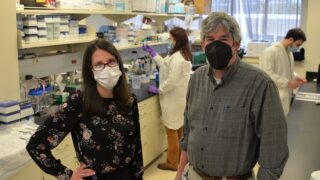Areas of Study
Vascular and Tumor Biology, Tumor Microenvironment, Angiogenesis, Endothelial Cells, Neurofibromatosis, Retinopathy, Vascular Malformations, Wound Healing, Cell Signaling
Education
- University of Michigan Medical School1997Post-doctoral fellow
- University of Connecticut Health Center1993PhD
Research
Endothelial cells proliferate, migrate and ultimately differentiate to form tubular blood vessels. This process, known as angiogenesis, is critical for providing oxygen and nutrients to developing tissues in the embryo, and for growth and repair processes in the adult. In addition, the endothelium is a critical regulator of the tissue microenvironment; regulating many aspects such a interstitial protein composition, coagulation, and inflammation. The growth of new blood vessels, and their proper functioning, are both critical determinants in numerous pathologies where extensive tissue remodeling takes place. Our lab is interested in the cellular signaling that regulates growth control and differentiation decisions in the vascular endothelium, and how they might contribute to human diseases including:
Vascular malformations
Several genes in the Ras signaling pathway have been clinically linked with the development of vascular malformations, including RASA1, NF1, and PTEN. These can have devastating consequences when they obstruct or rupture in critical organs. A principal focus in the lab is dissecting out the molecular mechanisms involved with these cellular fate decisions in the venous malformations initiated by mutations in the PIK3CA gene, in order to uncover opportunities for intervention. We are using 3D organoid cultures, mouse modeling to probe both conventional signal/function relationships as well as unbiased discovery approaches using RNA-sequencing.
Retinopathy
Two of the leading causes of blindness in the U.S. are proliferative retinopathies, whereby excessive vascular remodeling in the retina damages the surrounding tissue architecture and integrity required for sight. To provide better insights into best possible treatment modalities, we are elucidating and modeling the underlying molecular aspects that drive this dysfunctional vasculature. We are particularly interested in the role RAS hyperactivation may play in driving proliferative retinopathy using mouse models.
Tumor Angiogenesis
The growth and metastasis of tumors is largely dependent upon the tumor's ability to stimulate angiogenesis. In addition, the abnormal vasculature that tumors promote often contributes to a tumor microenvironment than can negatively contribute to effective therapy. We are interested in molecular mechanisms to dampen and normalize tumor vasculature, in order to enhance response to conventional therapy and potentially promote novel chemotherapeutic and tumor targeted interventions.
Vascular Degeneration and Alzheimer's Disease
Age and dietary stressors (high fat and high glucose) can compromise vascular function. We are actively investigating the contribution of endothelial dysfunction to the manifestation of cognitive decline as part of a large multi-institutional project that uses a range of functional genomics approaches to investigate these linkages in humans and mice.
Our approach
We use a “hierarchical” and interdisciplinary approach to investigate cellular signaling systems. We start in primary human cell culture systems using a combination of cellular biology, molecular biology, and biochemical approaches. We then expand these studies into more complex co-culture and/or three-dimensional culture systems. Finally when warranted, we use genetic modeling in mice, typically using inducible and tissue specific gene activation or deletion, in order to test the modeling of human disease. Recently we have added the capability to extract from complex mixtures of cells, unbiased gene transcription data specifically from endothelial cells, using high throughput RNA sequencing.
Publications
View Kevin Pumiglia's articles on the National Institute of Health's PubMed website.
